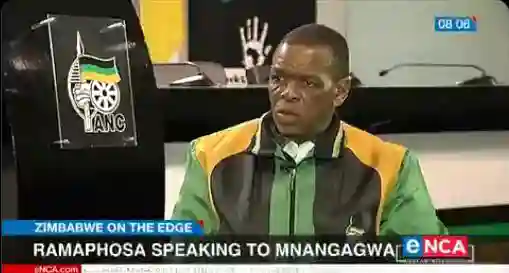The former Deputy Minister in the Ministry of Higher Education, Science and Technology Development, Godfrey Gandawa, said South Africa’s African National Congress delegation due in Harare this Tuesday will not achieve any tangible results.
Gandawa opined that the problem lies partly in how the crisis in Zimbabwe is viewed by some of the concerned parties, that is, ZANU PF’s G40 on one hand, and the MDC Alliance on the other hand.
While the G40 traces the genesis of Zimbabwe’s crisis to the November 2017 military coup, for the MDC Alliance, the “stolen” 2018 election embodies the crisis, which it considers a crisis of legitimacy.
For Gandawa, both narratives will not find any takers in the ANC delegation whose intention is to buttress the ruling ZANU PF party so that it can weather the storm. Below is Dr Gandawa’s post on Twitter:
At the risk of being the bearer of bad news, the ANC delegation that arrives in Harare today will not achieve any meaningful outcome. This is because what is widely described as a crisis, means different things to the stakeholders. The conversation starts at cross purposes.
The MDC believes that the crisis is a bilateral dispute between itself and Zanu PF, which can only be resolved by Zanu PF surrendering power to the legitimate winner of the 2018 election. Over the past two years, this has found expression as the ‘crisis of legitimacy’.
Meanwhile, the so-called G40 believes that the crisis arises from the 2017 coup which ushered in the Mnangagwa regime. The 2017 coup is viewed as the genesis of military interference and state capture. To fix Zimbabwe, the coup must be cured.
Unfortunately, the South African government does not accept any of these arguments. It recognises Mnangagwa as the legitimate president elected in 2018 and affirmed by the Constitutional Court decision rejecting the challenge to his victory. That matter is settled.
As far as the ANC and Ramaphosa’s envoys are concerned, they are not in Harare to negotiate a transfer of power or to relitigate the coup or the 2018 election. As they have repeatedly said, they want to help Zanu PF stabilize the situation so that it can survive this crisis.
The crisis has been decades in the making. Violence and capture of state did not start in 2017. Far from just a change of govt, Zimbabwe requires a fundamental shift in the relationship between the state and citizen. This is unlikely to arise from this engagement.
To be coherent, the opposition must recast its argument in sympathy with this reality. The People’s Grievances are stronger than the 2017 coup and stronger still than the disputed election. Locating the crisis as emanating from a single act in recent history is self-serving.

